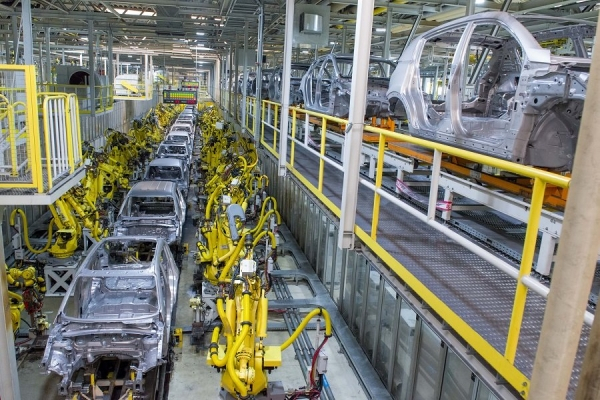Auto manufacturing costs
Heavy cost pressure set to drive up car prices
From copper and aluminum to tires and semiconductors, automakers face a near-universal rise in material costs
By Jun 01, 2021 (Gmt+09:00)
3
Min read
Most Read
LG Chem to sell water filter business to Glenwood PE for $692 million


KT&G eyes overseas M&A after rejecting activist fund's offer


Mirae Asset to be named Korea Post’s core real estate fund operator


StockX in merger talks with Naver’s online reseller Kream


Meritz backs half of ex-manager’s $210 mn hedge fund



South Korea’s automakers are facing a drastic increase in manufacturing costs.
Raw material prices are soaring and the global chip shortage remains an ongoing issue. Price hikes in iron ore, copper, aluminum and rubber have fueled the recent price surges in automotive steel sheets, tires and air conditioning components.
Industry watchers say that the growing cost pressure will likely push automakers to raise vehicle prices, starting with new model launches.
STEEL SHEET PRICE HIKE, FIRST TIME SINCE 2017
According to the auto industry on May 31, South Korea’s carmakers and steel manufacturers have agreed to raise the price of automotive steel sheets by 50,000 won ($45.22) per ton. The amount represents about a 5% increase considering that the previous price was around 1 million won ($904.66) per ton.
The agreement was made by Hyundai Motor Co., Kia Corp., POSCO, Hyundai Steel Co. and other steelmakers in the country. It is the first time since the second half of 2017 that the price of the steel sheets supplied to Hyundai Motor and Kia was raised.
Industry sources report that the price negotiation started as early as the beginning of this year, following the rapid rise in the cost of raw materials such as iron ore. According to the industry-representative S&P Global Platts Iron Ore Index (IODEX), the price of iron ore increased from $101 per ton last year to $158 per ton in the first quarter of this year.
“We proposed a price increase on our steel sheets to the automakers, highlighting the rapid rise in raw material costs this year,” said Hyundai Steel in May during its earnings call.
While the price negotiations were successful for POSCO and Hyundai Steel, Hyundai Motor and Kia will be hit directly by the rise in costs.
“Car prices will potentially increase as well, as they are calculated based on the prices of the key components,” said an auto industry official.
ADDITIONAL PRESSURE FROM OTHER COMPONENTS
South Korea’s three leading tire makers -- Hankook Tire & Technology Co., Kumho Tire Co. and Nexen Tire Corp. -- have also either already raised the prices of their products or shared their price adjustment plans for July.
Copper, another key material in auto manufacturing, has seen a striking 90.8% price increase over the past 12 months. According to the London Metal Exchange, the price of copper futures was $5,376 per ton on May 29, 2020, but it had almost doubled to $10,258 per ton on May 28, 2021.
Analysts say that the rapid rise in the price of copper will directly impact the consumer price of electric vehicles (EVs).
“Combustion engine vehicles on average use around 55 kg of copper, whereas EVs use around 65-80 kg per unit,” said Barron’s. Translated into financial figures, the automakers are now spending around $100 more to produce an EV than last year.
The EVs also need about four to five times more volume of semiconductor chips than the combustion engine models. The global chip market is still facing a shortage.
According to a survey conducted by the Korea Automobile Manufacturers Association (KAMA) in May, 50% of the country’s automakers responded that they are now purchasing automotive chips at prices 0-10% higher, whereas 33.3% said the prices they pay went up by 10-20%.
The story is the same for aluminum, which is used in automotive climate control systems.
“The automakers will be absorbing the rise in raw material costs. According to our contract terms, the price fluctuations in raw materials are tied to the price we sell to them,” said Hanon Systems Co., South Korea’s leading automotive climate control systems supplier, in May during its earnings call.
Write to Il-Gue Kim and Hyung-kyu Kim at black0419@hankyung.com
Daniel Cho edited this article.
More to Read
-
 Tire price hikesKorea’s major tire makers to raise prices as rubber supply tightens
Tire price hikesKorea’s major tire makers to raise prices as rubber supply tightensMay 31, 2021 (Gmt+09:00)
2 Min read -

-
 Global chip crisisGlobal automakers accelerate EV push as chip shortage eases
Global chip crisisGlobal automakers accelerate EV push as chip shortage easesMay 28, 2021 (Gmt+09:00)
2 Min read -
 Fuel cell trucksHyundai Motor’s new XCIENT truck raises hydrogen game in Europe
Fuel cell trucksHyundai Motor’s new XCIENT truck raises hydrogen game in EuropeMay 26, 2021 (Gmt+09:00)
3 Min read -
 Carbon neutralityHyundai Motor chairman vows to go carbon neutral, stresses electrification
Carbon neutralityHyundai Motor chairman vows to go carbon neutral, stresses electrificationMay 25, 2021 (Gmt+09:00)
2 Min read -
 SemiconductorsSecond-tier chipmakers ramp up investments amid chip shortage
SemiconductorsSecond-tier chipmakers ramp up investments amid chip shortageApr 25, 2021 (Gmt+09:00)
2 Min read
Comment 0
LOG IN


